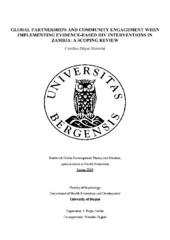Global partnerships and community engagement when implementing evidence-based HIV interventions in Zambia: A scoping review
Master thesis
Permanent lenke
https://hdl.handle.net/1956/20273Utgivelsesdato
2019-06-20Metadata
Vis full innførselSamlinger
- Master theses [165]
Sammendrag
Abstract Background and objective: In Zambia, 11% of the adult population is people living with HIV. To address this issue, collaborations are developed to implement interventions and scale up services to increase access to treatments and spread awareness about HIV to modify risk behaviors. In recent years after the Ottawa Charter, stakeholders and partners in these global health collaborations have acknowledged the benefits of engaging the community to culturally adapt the intervention to fit the communities` needs. The overall objective of the thesis is to get an overview and map out approaches used to engage the community in the implementation of evidence-based practice in HIV interventions in Zambia, and to understand how these partnerships functioned and if these efforts lead to meaningful improvements. Theoretical framework: The Bergen Model of Collaborative Functioning provides the theoretical framework for this study. Methods: A scoping review with a total of 12 articles with different research designs, both qualitative, mixed methods and quantitative. The data was charted by meta-synthesis methodology to extract knowledge and evidence found in the dataset to answer the research questions. Findings: The studies report how multiple methods can be used for engaging the community. Northern partners funded most of the studies. Antagonistic processes included participants dropping out due to employment, school, moving or being discouraged by low incentives. Some participants did not fulfill expectations of condom distribution. Overall, the vast majority had synergetic outputs, one had additive. Conclusion: The review of studies revealed that community engagement increased acceptability and effectiveness of the interventions described. Collaborations should focus on utilizing existing resources, including local leaders, training community members and building capacity to make sustainable changes.
